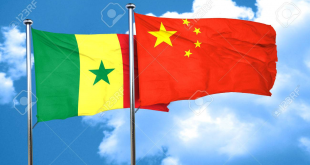Published: March 15,2024

By Teddy Kaberuka
The Chinese economy has experienced remarkable growth over several decades, with an average annual GDP growth rate exceeding 9 percent. Millions of people have been lifted out of poverty. During this time, the GDP has increased rapidly from 149.55 billion U.S. dollars in 1978 to 14.34 trillion in 2019, and there have also been significant improvements in access to health, education and other services.
This economic transformation has profound effects not only on China but also on the global economy. Through rapid industrialization, urbanization and technological advancements, China has emerged as a pivotal player in the global economic landscape. China’s robust manufacturing sector has served as the engine of its economic expansion. Leveraging its vast labor force and low production costs, China has emerged as the world’s factory, blending out an array of goods ranging from consumer electronics to heavy machinery. This manufacturing process has fueled export-driven growth and generated employment opportunities on a massive scale. As China continues expanding its influence on the world stage, its economic activities have increasingly extended beyond its borders, including the African continent.
CHINA-AFRICA TRADE AND INVESTMENT
China’s economic engagement with Africa has grown exponentially over the past few decades, making it Africa’s largest trading partner. Bilateral trade between China and Africa has surged, driven by China’s demand for natural resources and export of finished products, as well as Africa’s need for infrastructure development and investment. This mutually beneficial relationship has boosted economic growth and development in many African countries and beyond, creating opportunities for job creation, industrialization, and poverty reduction. China has become Africa’s largest trading partner, with bilateral trade reaching 282.1 billion U.S. dollars in 2023, according to the latest Chinese customs data. The investment worth 21.7 billion dollars in 2023 is part of China’s broader economic strategy to secure access to resources, open up new markets and foster diplomatic ties with African nations. In addition, China has invested in extractive industries such as mining and oil production, often in exchange for access to natural resources.Furthermore, Chinese companies have established manufacturing facilities in Africa, creating jobs and transferring technology to local economies. Investments in telecommunications, finance and other service sectors have also been notable.
INFRASTRUCTURE DEVELOPMENT
China has been heavily involved in financing and constructing infrastructure projects across the African continent to enhance transportation networks, trade routes and economic integration through the Belt and Road Initiative (BRI), launched by China in 2013. China’s BRI has become a cornerstone of its economic diplomacy, aiming to enhance connectivity and promote economic cooperation across Asia, Africa and Europe. The BRI has led to significant investments in infrastructure projects such as roads, railways, ports and energy facilities in Africa. These investments have improved connectivity within and between Africa and other regions, facilitating trade, investment and economic integration. African countries stand to benefit from improved infrastructure, which incentivizes economic growth, facilitates trade and attracts foreign investment.
CAPACITY BUILDING
China’s engagement with Africa also extends to development assistance and capacity building. Through initiatives like the Forum on China-Africa Cooperation, China provides aid, grants and concessional loans to support infrastructure projects, healthcare, education and agricultural development in Africa. Additionally, China offers scholarships and training programs for African professionals, enhancing human capital development and fostering long-term sustainable development. From China’s perspective, humanity shares a common stake in development, and world stability and prosperity can only be achieved if developing countries can progress. Therefore, China seeks a global community with a shared future. Through international collaboration, China has helped other developing countries mitigate the impact of the pandemic, accelerate action for the UN 2030 Agenda and achieve common prosperity.
GLOBAL ECONOMIC IMPACT
China’s economic growth has reflective implications for the global economy. As the world’s largest exporter and second-largest importer, China is pivotal in global supply chains, technology transfer and trade networks. Its robust domestic demand drives demand for goods and services worldwide, supporting economic growth and job creation in exporting countries. With huge factories and high demand for raw materials, China is the world’s top maker of goods and a big buyer of stuff like oil and metals. This means what China wants affects prices and supplies everywhere, shaking up how trade works and how things get made. For Africa, China’s economic expansion presents opportunities. China’s demand for commodities, such as oil, minerals and agricultural products, has provided African countries with lucrative export markets, contributing to economic growth and infrastructure development.
China’s increasing economic influence has led to calls for reforms in international financial institutions, such as the International Monetary Fund and World Bank, to better reflect the changing balance of economic power and coordination on global economic issues, contributing to a more inclusive and equitable global economic order. This helps other countries grow and gives China more power in global money matters, making its presence felt in international finance and trade.
The robust growth of the Chinese economy is transforming Africa and shaping the global economic landscape. Through trade, investment, infrastructure development and capacity building, China’s engagement with Africa fosters economic growth, reduces poverty and promotes sustainable development. Moreover, China’s integration into the global economy enhances stability, prosperity and cooperation, reinforcing its position as a critical driver of global economic growth and development.
Teddy Kaberuka is an economic analyst and international consultant from Rwanda.
Xinhua
 Africa -China Review Africa -China Cooperation and Transformation
Africa -China Review Africa -China Cooperation and Transformation
